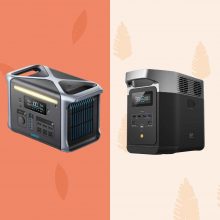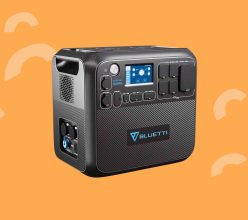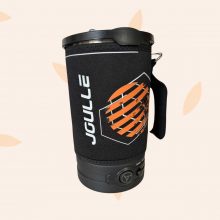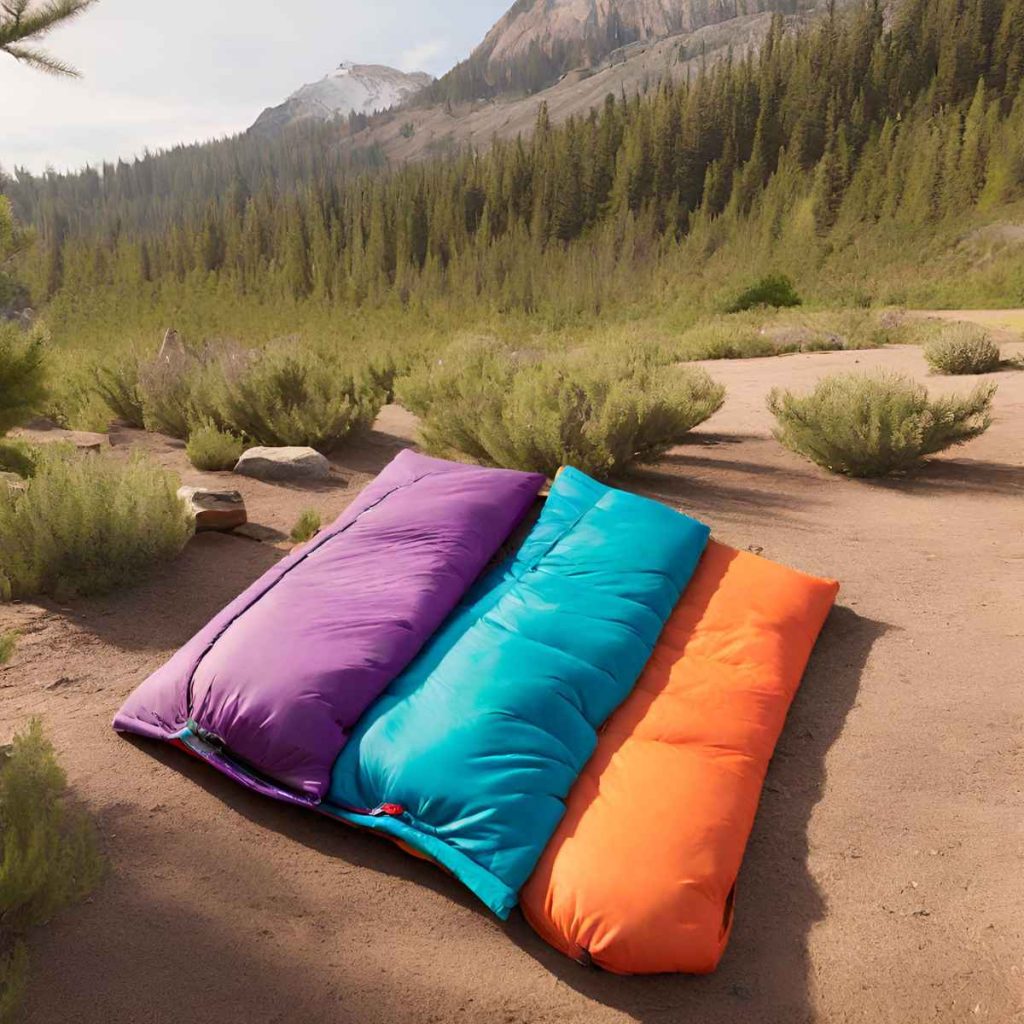
In this blog post, we’ll explore the best non-toxic sleeping bags, and explain how to choose one that’s free of chemicals.
Key Takeaways
- Flame retardants, PFCs, and waterproofing chemicals are often found in sleeping bag materials.
- Non-toxic sleeping bags reduce exposure to these chemicals, which also protects your health and the environment, and also supports eco-friendly manufacturing.
- When shopping for a non-toxic sleeping bag, it’s important to look at brand certifications, temperature ratings, insulation types, and weather resistance.
What are PFAs and PFCs?
Reasons to Avoid PFAs and PFCs
Studies show that exposure to PFAs and PFCs can be harmful, with increased risks of cancer, reproductive issues, liver damage, as well as effects to the immune system.
PFAs and PFCs also remain in the environment for centuries before they finally degrade. Humans and wildlife are exposed to PFAs and PFCs on a daily basis through skin contact or by inhaling fumes released during their use.
They may also contribute to climate change by depleting the ozone layer that protects us from ultraviolet radiation.
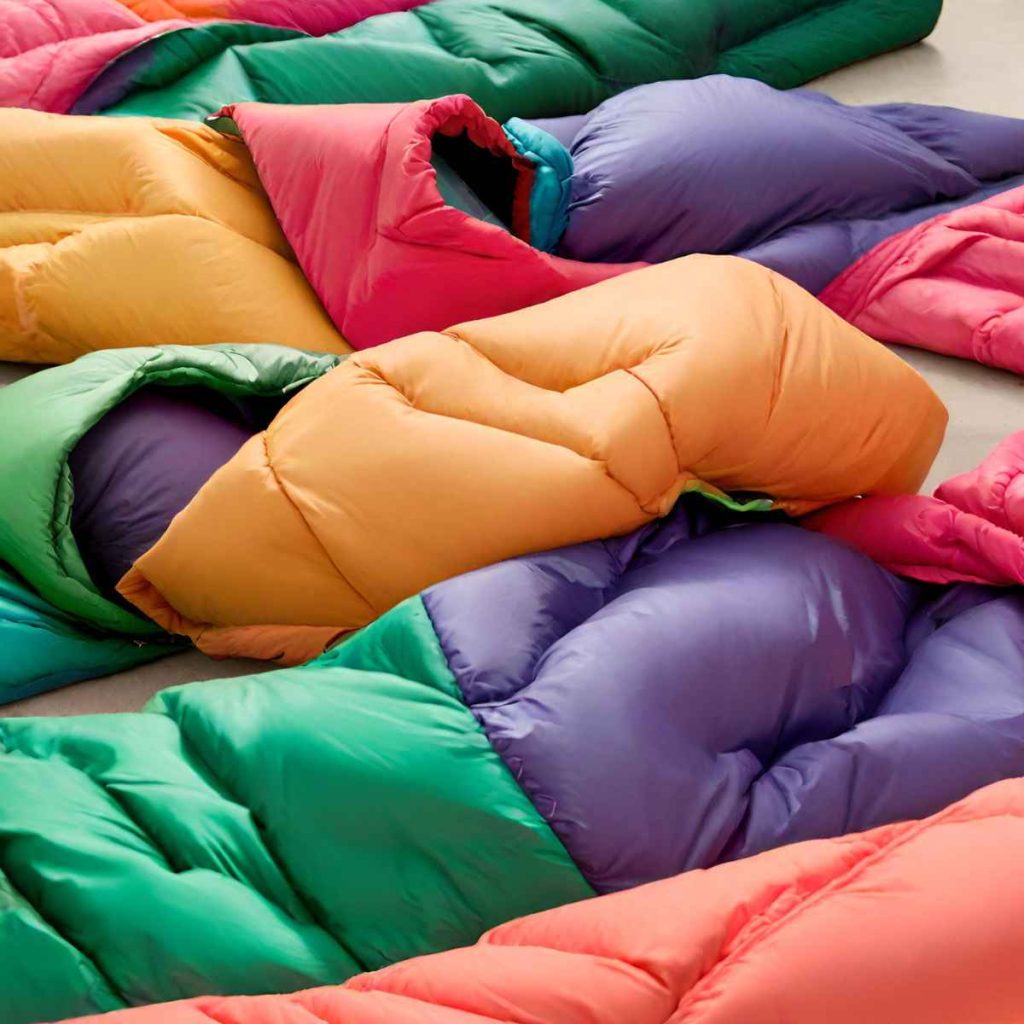
How to Choose a PFA/PFC-Free Sleeping Bag
- Certifications: Look for eco-friendly certifications like Bluesign Approved or GOTS Certified.
- Insulation type and fill: Choose a synthetic fill, like recycled polyester or sustainably sourced down.
- Lightweight options: Choose thinner and lighter materials to reduce weight and size of your sleeping bag without sacrificing warmth.
- Research brands: Look for companies that prioritize sustainability and non-toxic outdoor gear, like Big Agnes, Kelty and Wildkin.
- Fill power: A higher fill power indicates more pliable down feathers; this will translate into more compact packaging with increased warmth-to-weight ratio.
- Temperature rating: Purchase a sleeping with the correct temperature rating – based on your climate zone, frequency of use and where you plan to travel.
Where to Buy Non-Toxic Sleeping Bags (PFC/PFA-Free)
Therm-a-Rest Questar 0F
- The cold-weather winter sleeping bag in Therm-a-Rest’s top-rated and award-winning Questar line of warm and packable down backpacking bags
- 650 fill Nikwax Hydrophobic Down absorbs 90% less water and dries 3 times faster without using dangerous PFCs
- With Additional Room for Multiple positions (W.A.R.M.) fit means it allows for various natural sleep positions while maintaining thermal efficiency
- SynergyLink Connectors integrate the bag with a pad for optimal efficiency and comfort; zoned Insulation maximizes warmth and saves weight
- Regular left-zip bag measures 80x31.5x5.5 inches, fits heights up to 6 feet, packs to 8x10 inches, and weighs 2.69 pounds; storage sack and compression sack included
- PFC-free fabric made of polyester and durable water repellent (DWR) protection.
- Temperature rating of 0°F (-18°C) makes it great for winter camping.
- Lightweight design weighs just over two pounds
- Spacious mummy design contours to the shape of your body.
- Allows extra room for movement in the torso.
- Collared hood for protection in cold, windy weather.
- Attaches to an insulation pad.
Rab Solar Eco 0
- Sustainably Made | This sleeping bag promotes a low-impact lifestyle by using 100% recycled fabrics in the lining, insulation, and outer as well as using a fluorocarbon-free DWR treatment.
- Temperature Rating | Rab Sleep Limit: (5°C) 40°F; EN Rating: Comfort: (12°C) 54°F, Limit: (8°C) 46°F, Extreme: (-4°C) 25°F
- Tough Exterior | Recycled Atmos polyester ripstop fabric is plenty tough to handle life on the trail.
- Low-Bulk Warmth | Stuffed with synthetic insulation which will keep you warm even when wet, the Solar Eco line of sleeping bags was designed specifically to eliminate unnecessary materials, reducing...
- Temperature Rating | Rab Sleep Limit: (5°C) 40°F; EN Rating: Comfort: (12°C) 54°F, Limit: (8°C) 46°F, Extreme: (-4°C) 25°F
- Made with 100% recycled Stratus synthetic insulation.
- Features a central zipper that’s easy to open and close.
- Ultra lightweight design optimized for backpacking.
- Sustainable and socially responsible manufacturing.
VAUDE Sioux 400
- 2-Season (for late spring to Early autumn),
- Pleasantly warm
- Eco-friendly and fair manufacturing
- Made of water-resistant, recycled polyester.
- Allows improved ventilation so you don’t get overly hot or sweaty.
- Insulated with 3-season Polyester fiber synthetic fill.
- Bluesign approved materials.
Exped MegaSleep 25/40
- Sleeping Bag & Blanket in One - The Exped MegaSleep Duo is a supremely versatile 4-in-1 sleep solution, offering multiple configurations and temperature ratings
- Perfect for Spring or Summer - With lightweight synthetic fiber filling, the thermal performance is ideal for a cooler summer night
- Adaptable Insulation - Sleeping bag can be turned - heavier insulated side up for cool nights as low as 25°F, lighter insulated side up for warmer nights of 40°F
- Turns into blanket - Wraparound zipper allows sleeping bag to quickly and easily convert into blanket
- Sustainability is Our Second Nature - The Exped Mega Sleep Duo includes fabric eyelets that allow attachment to camping pads including EXPED sleeping mats, certified climate neutral through myclimate
- Roomy, rectangular design.
- Lightweight microfiber insulation.
- Versatile 25/40-degree temp rating.
Sierra Designs Get Down 35
- Lightweight, 3-season, sleeping bag.
- Specifically designed for women.
- Extra insulation around the core and feet area
- DownTek water repellent down fill insulation.
- Thermal efficiency provides extra heat retention
- Adjustable hood and face gasket.
- Optimized for backpacking in extreme weather.
- Flame retardant-free materials.
Kelty Cosmic 20F
- TRAPEZOIDS, MAN: Turns out this funky shape is ideal for helping sleeping bags retain heat. Trapezoidal baffle construction improves our best selling Cosmic sleeping bag for 2021. Fan favorite and...
- GET DOWN: Light, compressible, warm to boot; what’s not to love about Down Fill? The Cosmic features 550 fill Kelty treated DriDown insulation, with sustainably sourced materials that are easy to...
- ENTRY LEVEL VETERAN: Priced even lower for 2021, the Cosmic is more budget friendly than ever while retaining it’s well deserved reputation for a do-it-all backpacker’s slumber companion. First...
- DUAL ZIPPERS: Two sliding, locking zippers with anti-snag draft tube - unzip from the bottom to stick a foot out and self-regulate heat while enjoying mummy-bag comfort. Zippered internal stash pocket...
- KELTY QUALITY: Good craftsmanship speaks for itself. Since 1952 Kelty has designed and manufactured quality, useful, and durable goods for the everyman (and woman) seeking to enjoy life outside....
- Ethically sourced, 600-down power fill.
- Compact, lightweight Mummy shape design.
- Provides superior insulation in cold weather.
Benefits of Non-Toxic Sleeping Bags
By investing in a PFA/PFC-free sleeping bag, you are helping to reduce environmental impacts, minimize health risks and encourage the use of recycled materials.
Reduced environmental impact
Using PFA/PFC-Free sleeping bags is one way that outdoor enthusiasts can make a positive contribution to the environment. The elimination of perfluorinated compounds (PFCs) and PFAs which are often found in conventional camping gear, helps reduce emissions of these toxins into the natural environment.
Brands such as Sierra Designs have made a commitment to eliminate PFCs entirely from their line of sleeping bags due to recognized environmental concerns. Additionally, many brands are striving for higher levels sustainability by using recycled materials in the construction on their products or ensuring that tough ethical standards are met during production and supply chain activities.
REI Co-op has gone even further, ranking different brands based on how they manage environmental impacts associated with their products. By using a non-toxic sleeping bag rather than traditional options campers will be supporting an eco-friendly approach that leads to reduced detriment to water systems and other areas due to harmful chemicals being released into nature.
Safer for health
PFA/PFC-free sleeping bags are an invaluable option for outdoor enthusiasts who prioritize health and safety. These sleeping bags provide excellent insulation without introducing the risks associated with perfluorocarbons (PFCs).
PFCs are commonly incorporated in many camping gears such as rain jackets, tents and sleeping bags, but research has shown them to be extremely persistent and potentially harmful for your health.
By avoiding the use of these chemicals, non-toxic sleeping bags promote a healthy sleep environment where you can rest free of worries that the flame retardants from your outer clothing might enter your system while you rest.
Responsible brands like Kelty instead prioritize the use of safe materials when crafting their products—from goose down since it’s naturally flame resistant to infusing water repellent coatings without using any PFAs or chemical therapies that could pose a risk to health over time.
Use of recycled materials
Using recycled materials in the production of non-toxic sleeping bags presents a great opportunity to save resources and reduce our waste. This can lead to energy savings, reduced emissions, and help us conserve natural resources such as petroleum-based synthetic fabrics, water, animal fur or feathers used for insulation.
For example, thermal-Q synthetic fill in some backpacking sleeping bags contain up to 70% recycled polyester while Big Agnes’s Synthetic Sierra Down family of camping sleeping bags use post-consumer plastic bottles salvaged from landfills as their main insulation material.
These brands also offer other benefits with their use of eco-friendly materials: not only does using recycled materials reduce manufacturing costs but it cuts down significantly on carbon footprints too.
Certification for non-toxic sleeping bags
Certifications exist for non-toxic sleeping bags, providing assurance that no harmful chemicals or flame retardants have been used in their production. Such certifications are important to guarantee the safety and health of consumers who use these products.
The Bluesign Standard is one example, guaranteeing only safe materials are used during product manufacturing as well as ensuring every stage of the process has low environmental impact.
Oeko-Tex also provides a certification platform that tests textile products and ensures they do not contain any hazardous substances which can pose a risk to human health. They also ensure all raw materials used are free from PFCs (polyfluorinated compounds).
This helps maintain strong consumer trust since it shows brands compliance with safety regulations when producing sleeping bags without compromising customer comfort or quality of sleep experience.
Academic Research on PFAs and PFCs
Understanding the impacts of PFAs and PFCs on human health and environmental impact is a key part of choosing a safe, non-toxic sleeping bag for your next adventure.
Impact on health and environment
PFAs and PFCs have been linked to significant environmental contamination and various adverse health effects. Exposure can cause developmental issues, reproductive health problems, hormone disruption, immune system dysfunction, and further decrease of life quality in affected communities.
Not only do these toxins harm human health but they are also detrimental to the environment as well – due to their strong persistence in the atmosphere; referred to as ‘forever chemicals’ they have caused a depletion of the ozone layer.
Furthermore, chemical pollution has found its way into food sources thus exposing individuals living close-by industrial plants or waste sites with higher levels of PFAs than those not directly exposed.
How to Choose a PFA/PFC-Free Sleeping Bag
- Check the label for confirmation that it is a non-toxic sleeping bag: Look for eco-friendly certifications such as The Nordisk Ecolabel, or chemical-free materials like GOTS Certified Organic Cotton.
- Consider the insulation type and fill: Choose a synthetic fill with recycled polyester, or down that has been sustainably harvested from certified sources.
- Select lightweight options: Choose thinner and lighter materials to reduce weight and size of your sleeping bag without sacrificing warmth.
- Research brands: Look for companies that prioritize sustainability and non-toxic outdoor gear, including sleeping bags, such as Kelty and Wildkin.
- Consider fill power: A higher fill power indicates more pliable down feathers; this will translate into more compact packaging with increased warmth-to-weight ratio.
- Check temperature rating: Purchase based on your climate zone, frequency of use and travels with an appropriate temperature rating.
Conclusion
It is important to consider the value of non-toxic sleeping bags when purchasing gear for camping and outdoor activities. In choosing a PFA/PFC-free sleeping bag such as ones offered by Teton, Patagonia, Kelty Cosmic or Sea to Summit, you can rest assured knowing that it doesn’t contain any harmful chemicals like flame retardants.
These non-toxic sleeping bags are also more eco-friendly with their use of recycled materials like Seealp 500’s down filling and packaging and other brands’ organic cotton fabric shells.
Furthermore, they provide safer insulation compared to other synthetic material options. For those wanting an even more sustainable choice with certifications for non-toxicity on top of all that—Merino Wool Sleeping Bags from Wildkin offer just that! Ultimately, choosing a non-toxic sleeping bag helps reduce environmental impact while improving safety and comfort during your outdoor adventures.



